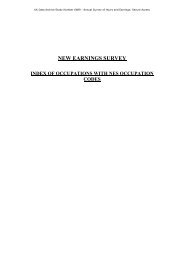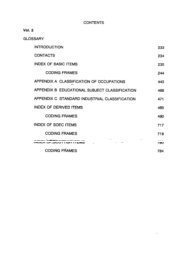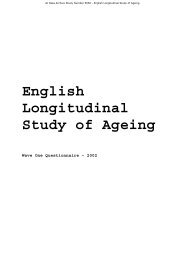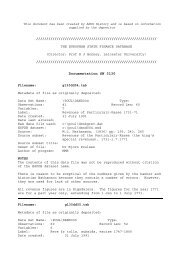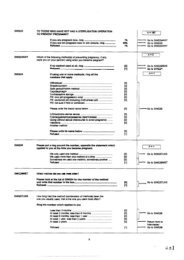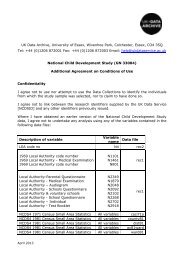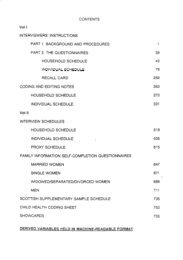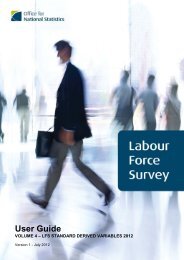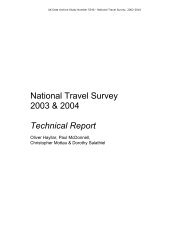UK Databytes, Issue 35 - ESDS
UK Databytes, Issue 35 - ESDS
UK Databytes, Issue 35 - ESDS
Create successful ePaper yourself
Turn your PDF publications into a flip-book with our unique Google optimized e-Paper software.
www.esds.ac.uk December 2009 - February 2010 Number <strong>35</strong><br />
It is that season<br />
again when<br />
we look back over the closing<br />
year and ahead to the next, which<br />
also marks the start of the second<br />
decade of the millennium.<br />
The future<br />
Looking ahead to 2010, there will<br />
be the usual full programme of<br />
workshops and user meetings.<br />
<strong>ESDS</strong> will also be developing<br />
further web-based resources for<br />
researchers and data managers,<br />
and behind the scenes there will<br />
be significant redevelopment of<br />
systems. The most important event<br />
for <strong>ESDS</strong> will be the mid-term<br />
review by ESRC and JISC, which<br />
will assess the impact of <strong>ESDS</strong> as<br />
a service over the last five years<br />
and, towards the end of 2010, will<br />
make recommendations for the<br />
future funding of the service.<br />
Advisory Committee<br />
We also wish to thank all the<br />
hard working members of the<br />
<strong>ESDS</strong> Advisory Committee for<br />
their contribution during 2009.<br />
Some members travel great<br />
The newsletter of the Economic and Social Data Service<br />
<strong>UK</strong> <strong>Databytes</strong><br />
Season’s Greetings<br />
<strong>ESDS</strong> is now over seven years<br />
old and has matured into the<br />
service delivering social science<br />
and economic data in the <strong>UK</strong> and<br />
it seems fitting at the end of 2009<br />
to thank all our 42,000 registered<br />
distances to attend meetings and<br />
their expertise is greatly<br />
appreciated. Under the<br />
chairmanship of Audrey Brown,<br />
the Committee has met twice<br />
during the year and on both<br />
occasions has provided valuable<br />
commentary on <strong>ESDS</strong> current and<br />
future activities. The next meeting<br />
will take place in London on 11<br />
February 2010 when it is<br />
expected that a draft mid-term<br />
review evaluation report will be<br />
considered.<br />
<strong>ESDS</strong> Annual Report<br />
2008-2009<br />
The Annual Report for<br />
2008-2009 has just<br />
been published and<br />
is available both<br />
as a PDF<br />
document and<br />
in print form. As<br />
in previous years,<br />
users for their continued support.<br />
So to all our users may we wish<br />
you a very happy Christmas and<br />
please be assured <strong>ESDS</strong> will not<br />
rest on its laurels in the coming<br />
year.<br />
the publication carries case<br />
studies and general reports from<br />
each of the specialist <strong>ESDS</strong><br />
services, plus a statistical report<br />
for the whole of <strong>ESDS</strong>.<br />
Highlights of 2008-2009 include<br />
a significant increase in the<br />
number of datasets delivered to<br />
users, which exceeded 50,000 for<br />
the first time, and a trebling of<br />
longitudinal datasets added to the<br />
<strong>ESDS</strong> collection and processed.<br />
www.esds.ac.uk
<strong>UK</strong> <strong>Databytes</strong> December 2009 - February 2010<br />
<strong>ESDS</strong> Government Research Conference: Crime, Safety and Community<br />
The <strong>ESDS</strong> Government annual research<br />
conference, held in November 2009 at the<br />
British Academy London, focused on the<br />
topic of Crime, Safety and Community,<br />
showcasing recent research using <strong>ESDS</strong><br />
datasets. Professor Paul Wiles, Chief<br />
Scientific Advisor to the Home Office,<br />
chaired the one-day conference.<br />
Two papers, drawing on the Offenders<br />
Cohort Index, looked at offending behaviour:<br />
Professor Brian Francis addressed<br />
specialisation and escalation among<br />
offenders, while Professor Keith Soothill<br />
explored the risk of offending among exoffenders<br />
and non-offenders, and whether<br />
and/or when ex-offenders should be treated<br />
like non-offenders.<br />
Helen Chester drew on the British Crime<br />
Survey (BCS) to explore property crime<br />
using multi-level modelling and found that<br />
household characteristics explained more of<br />
the variation in property crime victimisation<br />
than area-level characteristics. However, a<br />
number of important issues appeared to<br />
affect this assessment, namely the way that<br />
‘area of residence’ was defined, the<br />
sampling strategy of the BCS, and the<br />
selection of variables included in the<br />
models. These issues were discussed,<br />
together with recommendations for further<br />
research, policy and practice.<br />
Professor Tim Hope used the BCS and the<br />
Scottish Crime and Victimisation Survey to<br />
explore the distribution of crime victimisation<br />
Pioneers of Qualitative Research<br />
This summer <strong>ESDS</strong> Qualidata launched<br />
its Pioneers of Qualitative Research web<br />
pages. Pioneers introduces and will provide<br />
access to a series of fascinating life history<br />
interviews conducted in the last ten years by<br />
the oral historian Paul Thompson with over<br />
twenty pioneering social researchers,<br />
including Peter Townsend, Ray Pahl and<br />
Dennis Marsden.<br />
These interviews and the related sections<br />
of the web site provide insight into the lives,<br />
intellectual development, major influences<br />
and research projects of a set of innovative<br />
and influential social researchers from the<br />
1960s to the 1980s. The views of the<br />
interviewees on the development of their<br />
methodological approaches over the course<br />
of their academic lives are of particular<br />
value. Freely available to access, these<br />
extracts from the interviews include: audio<br />
clips; background information on the<br />
pioneers, such as key publications; and the<br />
datasets available from the <strong>ESDS</strong> web site.<br />
The complete interview transcript and audio<br />
file are also available for download.<br />
This project emerged from the initial goal<br />
of Qualidata (the forerunner of <strong>ESDS</strong><br />
Qualidata), following its 1995 creation in the<br />
Department of Sociology at the University of<br />
Essex, to find surviving data from pioneering<br />
examples of social research. These classic<br />
studies, most less than fifty years old, were<br />
already disappearing. Qualidata was able to<br />
rescue a number of these studies and<br />
ensure that they were deposited at the <strong>UK</strong><br />
Data Archive and other <strong>UK</strong> research<br />
archives. Among these classic pioneering<br />
studies are Dennis Marsden’s Mothers<br />
Alone (SN 5072) and Peter Townsend’s The<br />
Last Refugee (SN 4750), both discussed in<br />
detail in their interviews with Paul<br />
Thompson.<br />
www.esds.ac.uk/qualidata/pioneers/<br />
New Head of IDP at the <strong>UK</strong> Data Archive<br />
The <strong>UK</strong> Data Archive is delighted to<br />
announce the appointment of John<br />
Shepherdson to the senior position of Head<br />
of Information<br />
Development and<br />
Programming<br />
(IDP).<br />
John takes up his new role at the Archive<br />
on 4 January 2010. He will be a member of<br />
the Archive’s senior Policy Group and will<br />
lead the strategic development of the<br />
Archive’s technical infrastructure and be<br />
responsible for the applications which make<br />
data available from the <strong>ESDS</strong> web site.<br />
in the population and his results suggest that<br />
delivering crime prevention to the general<br />
population as a whole, rather than targeting<br />
chronic victims, would produce better results.<br />
Dr Emily Gray reported on her work using<br />
the BCS to look at a new way of measuring<br />
the fear of crime, which differentiates<br />
between destructive worry that erodes<br />
quality of life and constructive worry that<br />
motivates vigilance and routine precaution.<br />
The final paper, which looked into who<br />
buys stolen goods, was given by Dr Mike<br />
Sutton who used the BCS and the<br />
Offending, Crime and Justice Survey as<br />
context for his qualitative work with thieves<br />
and fences. The research identified six<br />
market types for stolen goods and the paper<br />
discussed the need for national crime<br />
surveys to assess which of the six markets<br />
play major roles in facilitating theft.<br />
www.ccsr.ac.uk/esds/events/2009-11-<br />
18/index.html<br />
<strong>ESDS</strong> International<br />
for parliamentarians<br />
On 25 November 2009 <strong>ESDS</strong> International<br />
held two training courses for parliamentarians<br />
at Portcullis House in Westminster: a morning<br />
session for statisticians of the House of<br />
Commons library and an afternoon session for<br />
those of the House of Lords . This event was<br />
organised jointly by <strong>ESDS</strong> staff from Mimas,<br />
Manchester and the <strong>UK</strong> Data Archive,<br />
Colchester. Presentations were given by Celia<br />
Russell and Jo Wathan (Mimas) and Beate<br />
Lichtwardt and Birgit Austin (<strong>UK</strong> Data Archive)<br />
on international macro, international micro,<br />
government, and longitudinal data resources<br />
and possible applications. They were followed<br />
by hands-on sessions which were<br />
unfortunately cut short by Prime Minister’s<br />
Questions. Huge interest was also expressed<br />
in accessing research publications based on<br />
the data. <strong>ESDS</strong> International has a database<br />
of over 1,800 publications citing the data.<br />
Promoting and supporting the use of social
<strong>UK</strong> <strong>Databytes</strong> December 2009 - February 2010<br />
<strong>ESDS</strong> International<br />
Annual Conference:<br />
Real Data – Real World<br />
The <strong>ESDS</strong> International annual<br />
conference was held on 30 November 2009<br />
at the Institute of Materials in London, on<br />
the theme of ‘Real Data – Real World’. The<br />
event was well attended with participants<br />
attracted by a packed programme that had a<br />
strong focus on data providers from intergovernmental<br />
organisations.<br />
During the opening data provider session,<br />
participants heard about: new content and<br />
data dissemination methods from the<br />
International Monetary Fund; mapping<br />
development data from the World Bank;<br />
challenges facing International Energy<br />
Agency statisticians; data citation and<br />
referencing methods from the Organisation<br />
for Economic Co-operation and<br />
Development; a new database from the<br />
United Nations Industrial Development<br />
Organisation. They also learned about the<br />
longitudinal study of childhood poverty from<br />
science data in research and teaching<br />
the Young Lives international research<br />
project. This session ended with a lively<br />
panel discussion, giving participants the<br />
opportunity to ask questions of the data<br />
providers.<br />
The first session after lunch focused on<br />
international data in academic research and<br />
took the form of a ‘Pecha Kucha’ with each<br />
speaker presenting 20 slides, each<br />
displayed for 20 seconds. It was a fast<br />
moving and fascinating session with<br />
researchers speaking on topics such as:<br />
‘Twin Deficits: New Evidence from Arab<br />
World’; ‘Financial Risks and Banking Sector<br />
New frameworks for measuring<br />
the progress of nations<br />
The Organisation for Economic<br />
Cooperation and Development (OECD)<br />
World Forum on ‘Statistics, Knowledge and<br />
Policy’ took place in Busan, Korea on 27-30<br />
October. Organised in co-operation with the<br />
European Commission, the United Nations<br />
and World Bank, the conference marks a<br />
major milestone in the OECD’s Global Project<br />
which aims to develop better measurements<br />
of national and regional progress.<br />
Keynote speaker Joe Stiglitz argued<br />
passionately that the global financial crisis<br />
has highlighted the inadequacy of current<br />
measures of economic performance, in<br />
particular those based on Gross Domestic<br />
Product (GDP). The Stiglitz Commission<br />
recently proposed a major new system for<br />
measuring societal well-being which<br />
integrates indicators of economic,<br />
environmental, and social sustainability. The<br />
subsequent debate on how national progress<br />
should be evaluated and how new<br />
measurement systems can be integrated into<br />
current frameworks provided the central<br />
themes of the conference.<br />
Over 2,000 people from 130 countries<br />
attended the event, including Celia Russell<br />
and Paul Murphy of <strong>ESDS</strong> International,<br />
whose research examining the academic use<br />
of cross-national data was published by the<br />
OECD as a background paper to the<br />
conference.<br />
oecdworldforum2009.org/<br />
Performance’; and ‘Financial Dollarization<br />
and European Union Membership’.<br />
A session on ‘International Collaboration’<br />
concluded the day and included a<br />
presentation on opening up access to and<br />
sharing of data resources to help<br />
understand and resolve complex challenges<br />
of the modern world.<br />
A full report on the day, as well as slides,<br />
abstracts, audio and video clips will be<br />
made available on the event web page:<br />
www.esds.ac.uk/international/news/conf2009<br />
.asp<br />
Workshop in Kent<br />
Following the event ‘<strong>ESDS</strong> — what’s in it<br />
for librarians?’ at the Royal Statistical<br />
Society on 13 February 2009, <strong>ESDS</strong><br />
received an invitation from a participating<br />
Academic Liaison Librarian to give a handson<br />
workshop for academic staff at the<br />
University of Kent before the new academic<br />
year started. It was anticipated that this<br />
would be of interest to staff in various<br />
subject disciplines. Indeed the subject<br />
specialisms of the workshop participants<br />
held at the University of Kent on 8<br />
September 2009 ranged from biosciences,<br />
medicine and health sciences to modern<br />
languages, economics, sociology,<br />
archaeology, history, theology and<br />
philosophy.<br />
The workshop focused on which data and<br />
services are available via <strong>ESDS</strong>, and how<br />
to find, access and use the various<br />
resources. The online analysis tools Nesstar<br />
and Beyond 20/20 played a special role in<br />
the live demonstrations and were followed<br />
with huge interest. This provided the perfect<br />
preparation for the final hands-on session<br />
where the participants could explore the<br />
<strong>ESDS</strong> web site and online systems,<br />
searching for resources related to their<br />
specific areas of<br />
interest and finding<br />
answers to their<br />
own questions.
The work of the Research<br />
Data Management and Support Services<br />
(RDMSS) team at the <strong>UK</strong> Data Archive has<br />
recently been bolstered by the award of two<br />
new grants to work on bespoke data<br />
management support and training for<br />
researchers. The team currently supports<br />
ESRC grant applicants and award holders<br />
on behalf of the <strong>ESDS</strong> and the Rural<br />
Economy and Land Use Data Support<br />
Service (RELU-DSS).<br />
The first grant is supported by JISC under<br />
the Data Management Infrastructure<br />
Programme which aims to provide the <strong>UK</strong><br />
Higher Education sector with insights and<br />
pilot solutions for managing research data<br />
within or across institutions. The project,<br />
which runs for 15 months from 1 January<br />
2010, will work with data-rich research<br />
‘hubs’, such as ESRC Centres and<br />
Programmes, by assisting with the planning<br />
and implementation of data management<br />
procedures. The project will also address<br />
particular areas of research: high-value data<br />
resources, including non-reproducible and<br />
unique data; complex data, such as<br />
ethnographical or anthropological data; and<br />
data that have legal and ethical sharing<br />
issues, for example legal and political data.<br />
The second award is part of the fourth<br />
round of the Researcher Development<br />
Initiative (RDI) aimed at supporting a range<br />
of advanced and specialised training and<br />
development activities for researchers. The<br />
project runs for 18 months from 1 April 2010<br />
and will provide a programme of focused<br />
training for researchers and researcher<br />
support staff on key managing and sharing<br />
data issues in the social sciences. Topics<br />
covered will include: hands-on, practical<br />
training applied to different audiences; case<br />
studies based on ESRC studies archived at<br />
the <strong>UK</strong> Data Archive; user experiences,<br />
feedback and discussions during workshops<br />
for continuous, interactive development of<br />
workshop materials; and developing online<br />
materials based on the workshops. The<br />
project’s wider aim is to make the acquisition<br />
of data management and sharing skills an<br />
integral component of <strong>UK</strong> postgraduate<br />
training for social scientists.<br />
Principal Investigator, Louise Corti, and<br />
her co-investigators Veerle Van den Eynden<br />
and Libby Bishop, are delighted that both<br />
funders have recognised the value of<br />
targeted data management support and<br />
capacity building in managing and sharing<br />
data. The team views these skills as part of<br />
Economic and Social Data Service, <strong>UK</strong> Data Archive, University of Essex,<br />
Wivenhoe Park, Colchester, Essex CO4 3SQ, <strong>UK</strong><br />
Email: publicity@esds.ac.uk Tel: +44 (0) 1206 872319/873159 Fax: +44 (0) 1206 872003<br />
ISSN 1474-9149 (print) ISSN 1755-8239 (online)<br />
<strong>UK</strong> <strong>Databytes</strong> December 2009 - February 2010<br />
Christmas comes early for RDMSS at<br />
the <strong>UK</strong> Data Archive<br />
Data for undergraduate political science courses<br />
Since its inception, a key theme for the<br />
<strong>ESDS</strong> has been to provide teaching<br />
resources based on its data collection. The<br />
service has produced a growing number of<br />
teaching datasets, with usage logs<br />
indicating that these resources are used<br />
widely in the <strong>UK</strong> higher education sector.<br />
<strong>ESDS</strong> is keen to encourage researchers<br />
and teachers to deposit teaching material.<br />
The latest contribution takes the form of<br />
three ‘Data for Undergraduate Political<br />
Science Courses’ datasets, deposited by Dr<br />
Sean Carey and Dr Katharine Adeney, both<br />
from the University of Sheffield. Each<br />
dataset is an abridged and enhanced<br />
Teaching and learning resources<br />
<strong>ESDS</strong> has recently updated and<br />
enhanced its teaching and learning pages.<br />
They now include a new page on ‘Research<br />
version of the larger standard dataset<br />
available via the <strong>ESDS</strong> and focuses on a<br />
recent attitudinal survey. The three surveys<br />
are: The British Social Attitudes Survey,<br />
2005; The British Election Study, 2005; and<br />
Eurobarometer 64.2, 2005.<br />
These teaching datasets were produced<br />
under an ESRC award and accompany an<br />
article produced by Carey and Adeney,<br />
‘Contextualising the teaching of statistics in<br />
political science’, published in the journal<br />
Politics.<br />
www.esds.ac.uk/news/newsdetail.asp?id<br />
=2373<br />
Methods at <strong>ESDS</strong>’ which showcases some<br />
of the key resources to support the teaching<br />
of quantitative methods.<br />
www.esds.ac.uk/resources/learning.asp<br />
the portfolio of essential life-long skills that<br />
every researcher should possess – in<br />
addition to the usual proficiency in data<br />
collection methods and data analysis. The<br />
team passionately believes that these skills<br />
should become part of standard best<br />
practice in research.<br />
Two new staff will be appointed for the<br />
posts which will strengthen the training and<br />
outreach capacity of the RDMSS team at<br />
Essex.<br />
www.data-archive.ac.uk/news/newsdetail<br />
.asp?id=2372<br />
Forthcoming events<br />
8 January 2010: Census data workshop:<br />
Using Migration Data and the ONS<br />
Longitudinal Study, University of Cardiff<br />
20 January 2010: Timescapes Conference:<br />
the Craft of Qualitative Longitudinal<br />
Research, Cardiff School of Social Sciences<br />
22 January 2010: Exploring Population and<br />
Health Trends – the ONS Longitudinal<br />
Study, University of Surrey<br />
3 February 2010: Census data workshop:<br />
Changing Geography Masterclass,<br />
University of Southampton<br />
15-16 February 2010: Advanced Methods<br />
for Small Area Estimation, University of<br />
Southampton<br />
11-17 March 2010: 5-day intensive training<br />
in Biographic-Narrative-Interpretive Method,<br />
Narrative Interview and Interpretation,<br />
London<br />
12-20 March 2010: ESRC Festival of Social<br />
Science 2010, various venues<br />
15 March 2010: Census workshop:<br />
Overview of Census Data Resources,<br />
University of Essex, Colchester<br />
12-13 April 2010: JISC Conference 2010,<br />
London<br />
1-4 June 2010: IASSIST 2010: Social Data<br />
and Social Networking: Connecting Social<br />
Science Communities across the Globe,<br />
New York<br />
5-8 July 2010: Research Methods Festival<br />
2010, Oxford




